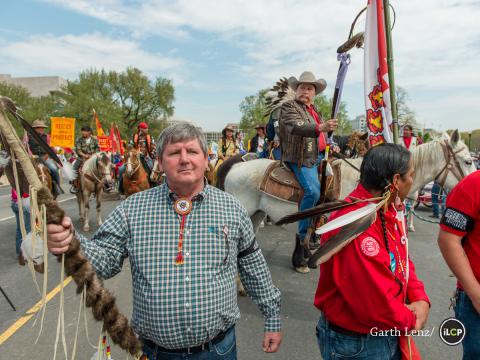As the Senate prepares to vote Tuesday on authorizing the Keystone XL pipeline, a South Dakota Native American tribal leader calls the House of Representatives' Friday vote approving the pipeline an "act of war," and says it will close reservation borders if the government attempts to build a pipeline there.
"The House has now signed our death warrants and the death warrants of our children and grandchildren. The Rosebud Sioux Tribe will not allow this pipeline through our lands,” tribe President Cyril Scott said in a statement. “We will close our reservation borders to Keystone XL.”
The Rosebud Sioux Tribe is not alone in its opposition to the pipeline. A new alliance of ranchers and Native Americans oppose the pipeline in South Dakota, and a number of tribes have adopted tribal resolutions against the project. And some South Dakota tribes have even been "preparing for nonviolent battle with “resistance training” aimed at TransCanada," reports McClatchy, adding that "they’re considering everything from vigils to civil disobedience to blockades to thwart the moving of construction equipment and the delivery of materials."
The House of Representatives voted 252-161 on Friday to approve the pipeline. The Senate will vote Tuesday on the controversial measure. Louisiana Sen. Mary Landrieu, co-author of the Senate Keystone bill, has indicated that she has the 60 votes necessary to support the bill.
The 1,660-mile pipeline would carry oil from Canada's tar sands to refineries in Texas. Three phases of the pipeline have already been built and are in operation. Keystone XL, the fourth and final phase, is controversial because it runs through some environmentally sensitive areas, including the Ogallala Aquifer, one of the largest known freshwater aquifers in the world, which supplies water to a large portion of the Great Plains.
Keystone XL supporters say the pipeline would create much-needed jobs and lower energy costs. Those who oppose it, including many environmentalists, say the pipeline would increase US reliance on fossil fuels (since all the oil is exported abroad) and that the transport of tar sands oil, a very heavy form of crude oil, could have serious environmental consequences if it leaked. When burned, tar sands emit an estimated 17 percent more greenhouse gases than the average barrel of crude oil, according to a State Department analysis.
For tribe president Scott, concerns are both environmental and cultural.
The pipeline would violate the 1868 Treaty of Fort Laramie, an agreement between the Sioux and the US government, that allocated parts of the Dakota territory to the Sioux, Scott said. He also said he was not consulted by the US government or TransCanada, the Canadian company behind the pipeline.
“We are outraged at the lack of intergovernmental cooperation," Scott said in a statement. "We are a sovereign nation and we are not being treated as such. We will close our reservation borders to Keystone XL. Authorizing Keystone XL is an act of war against our people.”
Scott also echoed concerns shared by many environmentalists.
"The Lakota people have always been stewards of this land,” he said. “We feel it is imperative that we provide safe and responsible alternative energy resources not only to tribal members but to non-tribal members as well. We need to stop focusing and investing in risky fossil fuel projects like TransCanada’s Keystone XL pipeline. We need to start remembering that the earth is our mother and stop polluting her and start taking steps to preserve the land, water, and our grandchildren’s future."
“I pledge my life to stop these people from harming our children and our grandchildren and our way of life and our culture and our religion here,” he added Monday.
“Did I declare war on our government? No I did not,” said Scott. “Did I declare war on the Keystone XL pipeline? Hell yeah I did.”
When asked to clarify what "act of war" means, Scott told the Daily News, “Act of war means that we’re going to have to take legal maneuvers now."
But the Sioux may not have to fire any salvos, legal or otherwise. President Obama may stop the pipeline.
While it received congressional approval and is up for a vote in the Senate, the Keystone XL pipeline is unusual in that it requires a "presidential permit" because it crosses an international border. Mr. Obama has stalled on making a decision for some six years since he's been in office and reports have indicated that the president is leaning toward a veto.


Spread the word